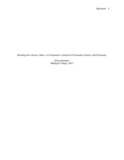| dc.description.abstract | Financial and economic literacy are essential for making sound investment, educational, financial, and political decisions, and yet some of the most developed nations in the world do not require all voting citizens to take courses in personal finance and basic economic theory. There is a strong case for economic and financial literacy influencing the overall prosperity of nations. When the general population better understands how economic systems work and how to properly steward their own resources, nations naturally become more prosperous. The empirical evidence presented in this paper shows a strong correlation between rising GDP and other quality of life indicators and the economic and financial literacy rates of the general population. In addition to increased economic and individual prosperity there are strong indications that education about financial and economic issues lead to more stable and transparent government systems. | en_US |

